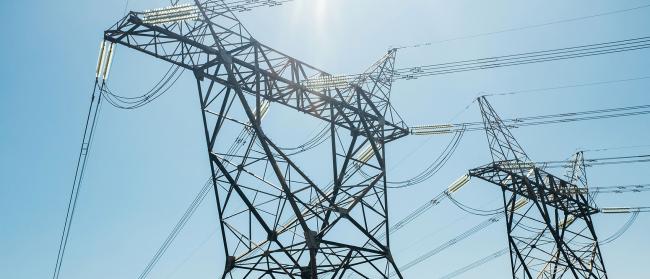 © Bloomberg. Pylon towers carry electrical power lines across open land in Johannesburg, South Africa, on Thursday, Oct. 6, 2016. Eskom Holdings SOC Ltd. is building new electricity stations to end the power cuts that were imposed for about 100 days last year, curbing growth in Africa’s most-industrialized nation. Photographer: Waldo Swiegers/Bloomberg
© Bloomberg. Pylon towers carry electrical power lines across open land in Johannesburg, South Africa, on Thursday, Oct. 6, 2016. Eskom Holdings SOC Ltd. is building new electricity stations to end the power cuts that were imposed for about 100 days last year, curbing growth in Africa’s most-industrialized nation. Photographer: Waldo Swiegers/Bloomberg(Bloomberg) — Prime Minister Malcolm Turnbull is facing a crucial test for his bid to fix Australia’s muddled energy policies, which have saddled the nation with sketchy power supplies and spiraling prices.
Energy minister, Josh Frydenberg, will attempt Friday in Sydney to win over his counterparts from the nation’s eight states and territories for his so-called National Energy Guarantee. Their agreement is necessary to move forward with the plan — still thin on details — that promises cheaper and more reliable power while reducing greenhouse gas emissions.
Turnbull’s Liberal-National government has to win over states run by his main Labor opposition, which are seeking greater commitments to reduce carbon emissions. And even if he succeeds, passage of the legislation through parliament may still fail as some lawmakers in his coalition lobby for more coal-fired power. The price of failure for Turnbull could be high — his government trails in opinion polls ahead of a national election due by May.
Though one of the world’s biggest sources of coal and , Australia has struggled to keep its own energy house in order amid a decade of political dysfunction and policy misfires. Consumers and manufacturers have been hit with higher energy prices as aging coal-fired power plants shut without a clear, and lower-carbon, way forward to replace that lost capacity.
To read about the political squabbling that left Australia’s energy system adrift, click here.
Turnbull is striving to engineer a plan that will deliver affordable and reliable energy, as well as reducing emissions, without subsidies, taxes, emissions-trading schemes or carbon prices. He also aims to encourage development of all types of power sources and provide the clarity investors want before committing to new projects.
“Business needs certainty, the confidence and the clear policy direction to make the necessary investments,” Richard Lancaster, the chief executive officer of Hong Kong-based CLP Holdings Ltd., the parent of EnergyAustralia, said in an interview Tuesday. “If we can get a strong consensus and a clear agreed plan, that gives business the confidence to invest.”
Road Ahead
The NEG may lead to a reduction in residential bills of about A$120 ($89) a year over the 2020 to 2030 period, Australia’s department of the environment and energy has said, citing the Energy Security Board.
The board, formed in August to provide advice to the states and territories on the NEG, listed in April eight key steps to maintain reliable electricity supply. The measures include the provision of a 10-year forecast from the Australian Energy Market Operator on whether the reliability standard will be met, along will recommendations on compliance and penalties.
Should it be implemented, the reliability section of the NEG will start in 2019 and the emissions component will commence in 2020, succeeding the Renewable Energy Target, according to the Clean Energy Council.
Turnbull claims he’s “agnostic” on the sources of new energy generation so long as they allows Australia to reach its Paris Agreement commitment of cutting emissions by at least 26 percent below 2005 levels by 2030. The former banker says he needs approval from all states and territories for the NEG for it to work efficiently.
Should that happen on Friday, Turnbull will use a meeting of his federal lawmakers on Tuesday to urge their approval for legislation to enact the NEG. For it to become law, his government would then need to win support of rival lawmakers to pass the legislation in the upper house, where it lacks a majority.
Queensland state Premier Annastacia Palaszczuk said she won’t make a decision on the NEG until she sees the legislation, which is unlikely to happen until Tuesday at the earliest. Meanwhile, Victoria state Premier Daniel Andrews had said his government won’t support the NEG in its current form because it doesn’t do enough to tackle pollution.
Lawmakers in Turnbull’s own coalition may also prove obstacles. They include former Prime Minister Tony Abbott, who has said Australia should abandon its Paris commitments and has threatened to vote against the NEG legislation.
“Turnbull has a bit of a minefield to walk to get this plan through,” said Paul Williams, a political analyst at Brisbane’s Griffith University. “Rising energy costs go right to the heart of voters’ concerns about cost-of-living pressures, so they won’t be in a forgiving mood should his signature policy to ensure cuts to electricity prices falls short.”
Source: Investing.com



























